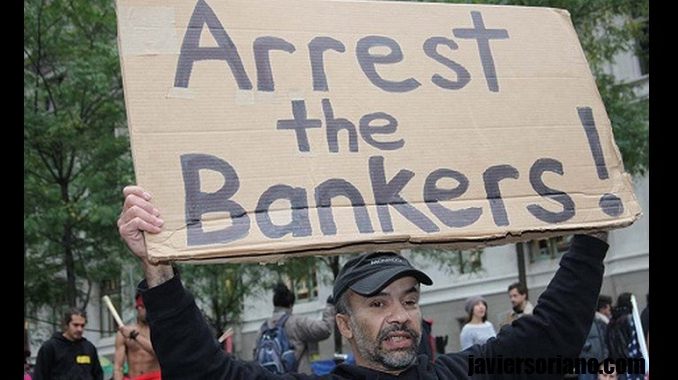The Big Short 2.0—Merchants of Debt Are Playing Musical Chairs, and the Band Just Stopped
The Wizards of Wall Street are back with a blast from the Great Recession past: repackaging and selling off debt.
The banks are making a bundle. But with the way the economy is running, chances are that a lot of people will be burned when the foundation crumbles.
And if things go as they typically do, you, the taxpayer, will pick up the bill.
Debt is a popular way for the wealthy to make money. Donald Trump has called himself the “king of debt” and regularly directed his companies to take on massive amounts. When things went belly-up—like four times with casinos, where the house is always supposed to win—he left others to hold the bag and clean the mess.
In theory, the financial engineering can work out, so long as the economy is stable and enough debt payments arrive on time and investors receive their payments.
But compared to the real experts, Trump is a piker.
Wall Street sees sums many times Trump’s imaginarily inflated net worth pass through their fingers every day, often by repackaging other people’s debt rather than taking on their own.
The Setup
The current deals du jour are the collateralized loan obligation, or CLO, and the collateralized debt obligation, CDO.
CLOs are a way of making more money from corporate debt—the cash that companies borrow to do things like invest in new facilities or open markets. Or, these days, buy back their own shares to drive up stock prices and make their executives wealthier.
A CDO is similar but uses other debt: consumer or commercial mortgages, credit cards or auto loans as examples. A bank buys debt, which can include loans it originally made, bundles it, and sells it off.
In either type, buyers pay a fixed sum, like buying a bond. In return, they expect payments over time that recoup their initial investment plus interest. The debt payments from the people or organizations that had borrowed the money fund the checks to investors.
In the process, the bank unburdens itself of the debt, collects a hefty amount and moves on its merry way, investing the money it made in other projects—maybe more CLOs and CDOs. And if something goes wrong, it’s now someone else’s problem.
Been Here Before
Sound familiar? It should. Home mortgage-based CDOs were all the rage up to 2007. And then crashing housing prices and predatory lending practices helped bring on the Great Recession. Those mortgages, and the CDOs, weren’t as creditworthy as banks and rating agencies told investors.
People began losing their jobs, more defaulted on mortgages, putting extra pressure on an economy that eventually collapsed.
Although a CDO could withstand a certain amount of defaults, the proportion grew too large. Investors lost untold billions because the CDOs weren’t worth the paper they were printed on.
Teeing Up the Next Disaster
In theory, the financial engineering can work out, so long as the economy is stable and enough debt payments arrive on time and investors receive their payments.
But because of the Trump administration’s egregious handling of the coronavirus pandemic, the economy is anything but stable.
States like California, Florida and Arizona have had massive surges in infections, which ultimately will affect their economies. According to government figures, U.S. GDP for the second quarter fell at an annualized rate of 32.9%.
On July 11, there were still 30.2 million on unemployment insurance, almost a fifth of the labor force. The latest figures show 5.4 unemployed people per open job. All this while the GOP wants to pare down unemployment benefits to an effective 45% of the salary people had been making.
Tens of millions of people at this point aren’t even making that. The Republican-dominated Senate didn’t bother to act in time to keep any significant lifeline going.
As research and analysis firm Oxford Economics has been saying for a while, there is a looming economic “cliff” that could derail the recovery and send the economy even lower. About 68% of GDP comes from consumer spending and those people out of work largely can’t do their part.
Companies Come Next
The Census Bureau has been running weekly surveys during the pandemic. The results are grim.
More than a quarter of adults missed their most recent rent or mortgage payment or are unsure they can pay the next one. Greater than half have seen a loss in employment income; a third expect even more loss in their households.
Companies and the economy fail if people don’t spend enough. A sudden cut in the income for this many creates a vicious circle. People can’t pay bills, including rent. They get evicted. There’s more lost income for companies. More layoffs. And it’s back to the start for another trip around.
Companies were already in a bad spot. According to The Washington Post, nearly one in five public corporations are so-called zombies—staying afloat by borrowing more money to pay off previous loans.
Corporate defaults on loan obligations are higher now than in 2009, right after the massive crash, as banking expert Mayra Rodriguez Valladares wrote at Forbes. The total number of defaults could pass those in 2009. That’s bad news for the bundled debt business.
According to data from S&P Global Ratings, hundreds of CLOs have been downgraded to junk status.
If That Weren’t Bad Enough
The ineptitude of the Trump administration’s response to the pandemic has created an economic catastrophe. The country is really near the edge of a new depression.
But economic conditions aside, banks have taken outrageously dangerous liberties. A Wall Street whistleblower claims that big banks have been awarding commercial mortgages that corporate financials couldn’t support, according to ProPublica.
CDO-like financial vehicles called commercial mortgage-backed securities, or CMBSs, bundle commercial property mortgages and sell shares. Investors are interested in the profit level of the buildings to see if the mortgages are likely to be paid.
The charge is that the claimed profit levels often have been puffed up by banks—as much as 30% higher than they previously had been. Investors put money in based on lies.
No reason for surprise. Fabrication has been one of the features of bundling. As the authors of the new book Boom and Bust: A Global History of Financial Bubbles note, when lenders sell off debt, they are less likely to check its quality. Any losses land on the buyers. Morality and ethics walk out the door with responsibility and consequences.
Then there are other deals called synthetic CDOs. Instead of actual debt, these vehicles include financial derivatives. A derivative is—put plainly—legalized betting on whether a person or business pays off a loan.
Insurance giant AIG would have collapsed in 2008 over its derivatives trading had not the American taxpayer bailed it out.
Wall Street still hasn’t learned that incredibly complex mechanisms are dangerous. Their creators don’t understand all the things that can go wrong.
It’s worth wondering, if Senate Majority Leader Mitch McConnell (R-Ky.) and the GOP get their way with shielding business owners from legal liability in COVID-19-related suits, whether enterprising lawyers will find ways to extend the concept to banks. “Oh, sorry, your Honor, we had no idea what the real conditions of these companies would be during the pandemic.”
Or maybe the bankers won’t even worry. Whether after the Great Recession or in any other calamity the industry has caused over the decades, Wall Street always has gotten bailed out and taxpayers keep picking up the bill. Why will this time be any different?





